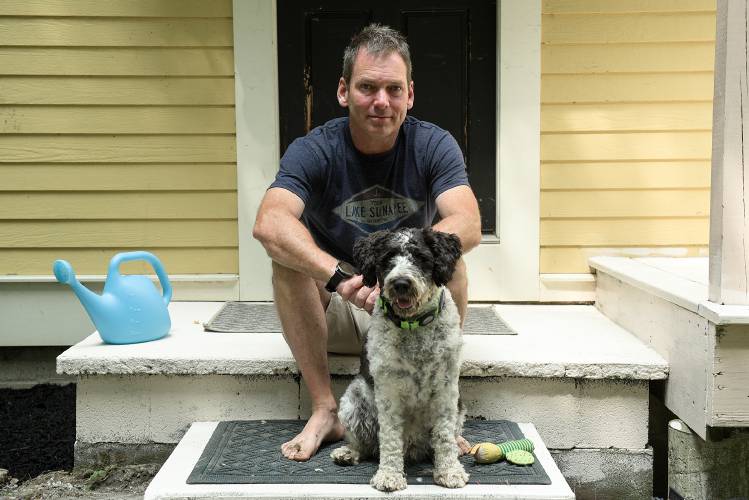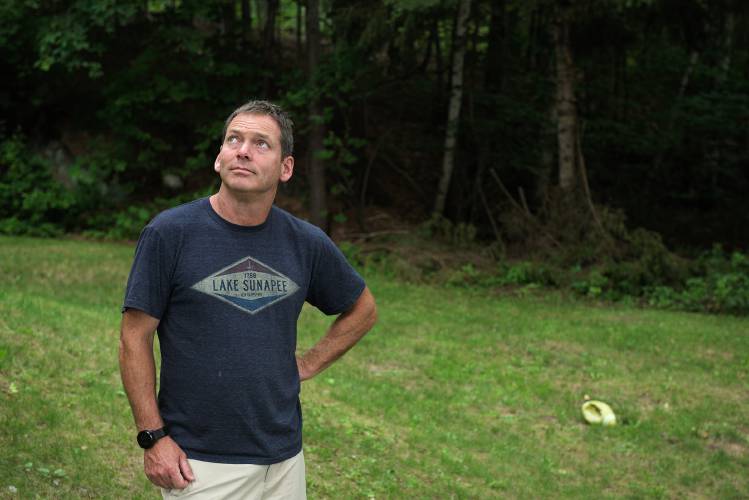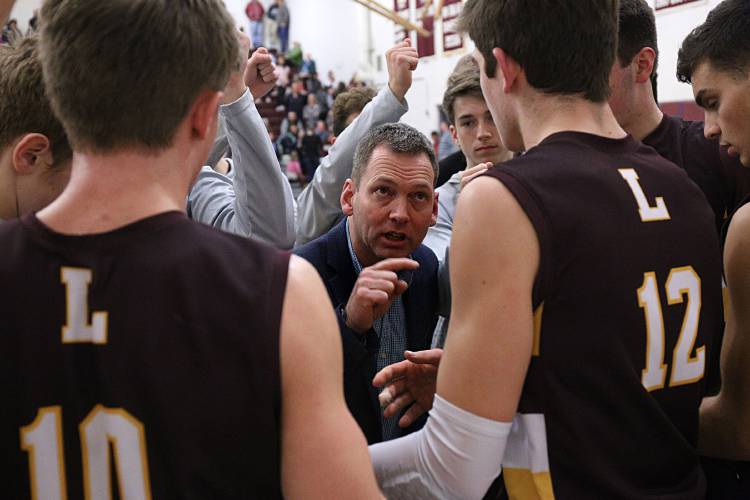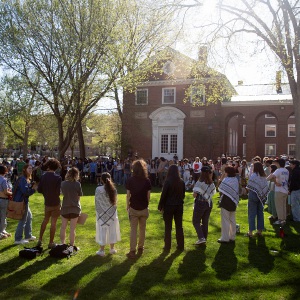Kenyon: Abrupt departure of longtime Lebanon High coach raises questions, but answers are few
| Published: 08-05-2023 10:00 PM |
When Lebanon High School teachers and administrators gathered in June to recognize their colleagues who were retiring or leaving for new jobs, one person was conspicuous in his absence.
Kieth Matte, who spent 24 years at Lebanon High as a physics teacher, assistant principal and boys basketball coach, was nowhere to be found.
On graduation night, students took note that Matte wasn’t on the stage with other school administrators for the handing out of diplomas.
What happened to make Matte persona non grata?
Lebanon school leaders won’t say, which is a problem in itself. A dearth of transparency erodes public trust, particularly when taxpayer dollars are involved.
Matte is in a tough spot. A separation agreement stipulates that he keep quiet. He can’t tell his side of the story in hopes of quelling the rumors that he did something egregious to lead to his awkward exit.
All the public has to go on came in mid-May — a month before the end of the school year — when then-Superintendent Joanne Roberts released a statement that said Matte was leaving his job, effective June 30, to pursue other employment.
“The district and Mr. Matte reached this agreement believing it is in their respective best interests,” Roberts, who departed in June after nine years at the helm, said in the statement.
Article continues after...
Yesterday's Most Read Articles
In other words, both sides could walk away feeling they’d won something in the negotiated settlement.
A public records request that I made showed Matte was paid his full salary ($98,119) for the 2022-23 academic year. He also received a retirement bonus ($14,712) under the school district’s collective bargaining agreement with the administrators’ union. To qualify, administrators must be 55 or older.
With Matte, who at 54 was just shy of eligibility, the district made an exception. I suspect it was part of the negotiations.
Matte wasn’t unemployed for long.
Last month, he started his new job as principal at Groveton, N.H.’s, grade 6-12 school with 200 students in the northern part of the state. He’s earning roughly the same salary that he did in Lebanon.
Lebanon school officials also got what they wanted. Out-of-sight, out-of-mind was their goal.
So who was lost in the mix?
Lebanon High students.
Matte was a central figure at the school. Arguably, his position as boys basketball coach — and the three state championships that his teams won — made him the school’s most high-profile staff member in the community.
As assistant principal, he dealt with some of the school’s most vulnerable students. Matte oversaw the special education department, which put him in contact with students who had special needs.
Although it had been seven years since Matte last taught physics, “if we were struggling in class, he let us know we could come to him for help,” said Sam Bates, a 2023 graduate and basketball team member.
The way Matte’s departure was handled left students in the dark. They deserved better.
During the last three months of the school year, students seldom saw Matte in the building.
When students asked about Matte’s absence, they were told by teachers that they “weren’t supposed to talk about it,” said Chris Perriello, who graduated in June and also played basketball. “It was a weird situation.”
“A lot of students are still confused about why he’s gone,” added Perriello, who is headed to St. Lawrence University. “I would have liked to have seen him get a proper send off. He definitely deserved it.”
To his players, Matte was more than a coach. “You could always go to his office to talk with him about anything,” said Dawson Bates, who was a tri-captain on last year’s team along with his twin brother, Sam, and Perriello.
But for months, school officials pretended Matte didn’t exist.
“When you don’t tell people why someone is suddenly gone, rumors are bound to happen,” Perriello said.
I recently gave Matte a call. He wanted to avoid discussing anything that Lebanon school officials could argue violated their agreement, but he still agreed to talk with me at his home on Kolelemook Lake in Springfield, N.H.
When I asked Matte about his departure from Lebanon High, he replied, “It didn’t end the way I wanted it to.”
“It hurt,” he added, referring to not being able to say goodbye to students at the end of the school year.
Friends and colleagues knew that Matte had been looking for a while to advance his career though a principal’s position. In the last few years, he’d been a finalist for openings at Hanover High and Kearsarge Regional, his alma mater in North Sutton, N.H.
Although he couldn’t talk about what led to his leaving Lebanon, Matte said when asked on employment applications if he’s ever been given the ultimatum “resign or be fired,” he answers no.
Matte can also show that he was never suspended from his assistant principal’s position. Under the collective bargaining agreement, administrators are entitled to a formal hearing with the school board before any disciplinary action is taken.
Last week, I reached out to Roberts, who now runs an educational consulting company, and Lebanon High Principal Ian Smith for comment. I didn’t hear back from either of them.
School Board Chairwoman Lilian Maughan responded that “district policy dictates that we do not comment on personnel matters.”
From what I can tell, a parting of the ways between Matte and the school district has been brewing for several years.
At Lebanon, like many high schools, the assistant principal serves as chief disciplinarian.
Students who run afoul of school rules, ranging from dress code violations and cutting classes to bullying and substance use, can find themselves in the assistant principal’s office.
Lebanon is among a half dozen Upper Valley school districts that employ a school resource officer, or SRO for short.
Lebanon has had an SRO for almost 20 years, but Matte was not a fan of the program. He says that he’s not “anti-cop” (his dad is a retired New Hampshire and upstate New York police chief), but thinks a police presence in schools is “counterproductive to our mission.”
Allowing an armed cop to set up shop inside schools is a lightning-rod issue in Lebanon. Since 2021, voters have twice voted to eliminate the position — the second time by more than 150 votes.
The School Board treated the ballot measures as nonbinding. Roberts went along with the board.
In a 2021 letter to the board, a group called Lebanon High School Students of Color Collective wrote that they oppose the “concept of police playing an active daily role in our schools. Police officers are not trained to deal with students in trauma.”
Greg Parthum, the city’s longtime SRO, divides his time between Lebanon’s four schools.
The school district and city split the cost of an SRO, roughly $120,000 a year, and it’s funded through at least the 2023-24 school year. But since the SRO is a member of the police department and not a school employee, school administrators have little control over what the SRO does day-to-day.
Matte has pointed to a February 2019 incident when a Lebanon High student was cited by police for an offense that went down in police records as indecent exposure.
The behavior: urinating in a snow bank in the school parking lot.
In a column I wrote about SROs in 2020, I mentioned the incident. At the time, I asked Smith about the SRO position. He told me via email that school administrators are “not involved with the decision-making process regarding how police choose to pursue cases and charges where SRO intervention is required.”
In this case, police allowed the student to enter a court diversion program to avoid a criminal record. As I wrote in 2020, requiring the student to go through a diversion program seemed extreme.
But as Smith told me, “which situations and misbehaviors end up resulting in students having to go to court (or) diversion” is the SRO’s call.
In recent years, nicotine vaping has become a growing problem for schools. The 2019 Youth Risk Behavior Survey found 34% of New Hampshire high school-aged kids have used an electronic vape product.
Under state law, anyone under the age of 21 who is caught vaping or in possession of vapor products can be subject to a fine of up $100.
Arguing vaping cases shouldn’t be a police matter, Matte handled them internally. “Police shouldn’t be going around giving out tickets to kids,” he said. “That’s not solving anything.”
Matte brought a “holistic approach” to the assistant principal’s position, said Andrew Gamble, a Lebanon social studies and technology teacher who retired in 2021.
For instance, with kids caught cutting classes or missing entire school days, “he tried to get to the root of the problem,” Gamble said. “He wanted to know if it might have something to do with their home life. He took a real caring approach.”
In January, Matte was asked to meet with Lebanon police Capt. Tim Cohen, who has since retired, and Lt. Alan Lowe.
He was told Lebanon police had launched an internal investigation into possible misconduct by Parthum.
According to a 320-page police report, which is a public record, Parthum was “alleged to have maintained inappropriate relations with a female student(s) while employed as a School Resource Officer.”
“Said relations include dating a recently graduated student, and maintaining relations with past students by means of inappropriate messages through social media platforms such as Facebook, Instagram, Twitter, etc.”
Parthum denied the allegations. In an interview with investigators, Parthum argued opponents of keeping Lebanon’s SRO position were trying to discredit him.
Police asked Matte what he knew about Parthum’s interactions with one female student in particular. “There was a time where I know Greg was spoken to about staying more professional with the young lady. It was reported to me. It wasn’t criminal. It was just sort of like, you know, this girl is in your office too much.”
“There was the issue of him liking Instagram posts,” of a girl in a bathing suit, Matte said. “It wasn’t very professional. If you’re a teacher, you’d be in a lot of trouble.”
Police also interviewed Smith, Lebanon’s principal, and Bonnie Robinson, the school’s director of curriculum.
Last fall, Robinson said she received an email with an audio recording in which a former student described feeling uncomfortable with Parthum’s line of questioning during his investigation into alleged sexting at the school.
“She was well-spoken, and it clearly is an incident that disturbed her and has stayed with her,” Robinson told investigators. “Based on that, I don’t feel comfortable with (Parthum) being in our school.”
The former student isn’t named in the police report and there’s no indication that she was interviewed during the investigation.
In his interview, Smith said there was a “cabal” in the community working to remove the SRO “through personal, unsubstantiated attacks.”
Since around the time of the COVID-19 pandemic, Parthum has spent about one day a week at Lebanon High. Most days, he works out of the middle school.
While Parthum is “not disruptive to our building,” Smith told investigators he wonders that if changing SROs — and having Parthum reassigned within the police department — is needed to “simply end the nonsense.”
A few of Parthum’s electronic messages were the only thing only thing “I really question,” Smith said.
In a Feb. 15 interview, Parthum told investigators the only part of his own conduct he “ever questioned” was a message he sent to a woman who had graduated a year or two earlier, encouraging her to “consider modeling.”
As a Lebanon High student, she had “talked about modeling.” Her older sister was a model, “and she was posting all these pictures,” Parthum told investigators. “So I was like, hey, you should do modeling… You could make money doing it.”
After sending the message, Parthum said he realized it “probably was stupid that I said that… Like that doesn’t probably look the best.”
Matte was also upfront with investigators. His problems with Parthum went beyond his philosophical difference that schools with SROs aren’t acting in the best interest of students.
Matte informed police that he had a “personal history with Greg.” Investigators said they were already aware of that before meeting with him at the police station.
In 2017, Matte and a Lebanon High staff member became romantically involved, according to an email that he shared with police.
One evening when Matte was at the woman’s home, Parthum showed up uninvited and “very intoxicated,” Matte told police in an email. After the woman asked Parthum to leave, he did.
Matte also showed police a text message that Parthum sent him the next day, apologizing for intruding.
Matte told investigators that he decided to turn over the information after they asked him if there was anything else he wanted to share.
The text helps explain why he had a “personal issue” with Parthum and it “illustrates another example of the inappropriate behavior that you are investigating,” Matte told investigators.
Matte and the woman had ended their relationship in the summer of 2019. The breakup was “amicable,” Matte told police.
Parthum and the same woman were married earlier this year.
In late February, Parthum was cleared of any wrongdoing. In the high school’s sexting investigation, Lebanon police determined he “acted within policy” and the questions he asked a female student were “pertinent to identifying possible actors.”
Cops investigating cops is far from ideal. Their impartiality is open to public scrutiny. But since Lebanon school officials showed no appetite for conducting an independent investigation, it’s what the public is left with.
Last week, I emailed Parthum to ask about the investigation, and Matte’s interview, in particular.
“I appreciate your offer to comment but believe it’s best not to at this time,” he said.
Between Lebanon school officials hiding behind privacy claims to avoid discussing the situation and Matte’s nondisclosure agreement, it’s difficult to decipher whether the revelations in the internal police investigation into Parthum’s alleged misconduct and Matte’s sudden departure are connected.
About a month after Parthum was cleared, Lebanon High students began to notice that Matte wasn’t in the building as much as usual.
If nothing else, it’s an odd coincidence.
Matte won’t be leaving the Upper Valley entirely. He’s keeping his lakefront home while renting an apartment in Lancaster, N.H., a short drive from Groveton.
Matte was among three finalists for the job, Superintendent Ronna HasBrouck said in a phone interview. A search committee included students who took him on a tour of the school.
“The kids really related to him,” HasBrouck said. “The search committee could see that he’ll be a big part of the community.”
Matte should feel right at home. The current longtime boys basketball coach has won seven state titles. The school’s small gym is packed for each game.
“Groveton is a basketball mecca,” said HasBrouck, who is starting a new job herself as superintendent in Nottingham, N.H.
As principal, it will be Matte’s job to stand at the front entrance of home games with a hand-held counter to keep track of how many fans are allowed in before the fire marshal starts getting nervous.
Matte’s love of high school basketball aside, I can think of another reason why he’s an ideal fit.
In Groveton, there’s no SRO.
Jim Kenyon can be reached at jkenyon@vnews.com.




 Dartmouth administration faces fierce criticism over protest arrests
Dartmouth administration faces fierce criticism over protest arrests Hanover house added to New Hampshire Register of Historic Places
Hanover house added to New Hampshire Register of Historic Places
